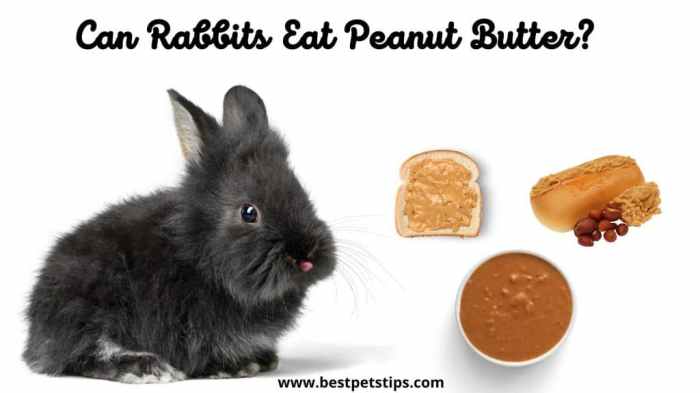Peanut butter, a beloved human snack, has sparked curiosity among rabbit owners, who wonder if their furry companions can indulge in this treat. While it may seem like a harmless indulgence, understanding the potential risks and benefits is crucial to ensure the well-being of your rabbit.
In this comprehensive guide, we delve into the safety considerations, nutritional value, alternative treats, and safe consumption methods of peanut butter for rabbits. By the end, you’ll have a clear understanding of whether or not this popular spread deserves a place in your rabbit’s diet.
Safety Considerations
Peanut butter is a food that should not be given to rabbits. It is high in fat and calories, and it can cause a variety of health problems for rabbits, including obesity, digestive upset, and pancreatitis.
In addition, peanut butter can contain harmful ingredients for rabbits, such as xylitol, a sugar substitute that can be toxic to rabbits. Even small amounts of peanut butter can cause serious health problems for rabbits, so it is important to avoid giving it to them altogether.
Potential Health Risks
- Obesity: Peanut butter is high in fat and calories, and it can contribute to weight gain in rabbits. Obese rabbits are more likely to develop other health problems, such as heart disease and diabetes.
- Digestive upset: Peanut butter can cause digestive upset in rabbits, including diarrhea, vomiting, and gas. These symptoms can be uncomfortable for rabbits and can lead to dehydration and other health problems.
- Pancreatitis: Peanut butter can cause pancreatitis in rabbits, a serious inflammation of the pancreas. Pancreatitis can be fatal if it is not treated promptly.
Nutritional Value

Peanut butter offers a unique blend of nutrients that can be beneficial for rabbits when consumed in moderation. It is a rich source of protein, fiber, and healthy fats, all of which are essential for maintaining a healthy body and overall well-being.
Protein
Protein is crucial for building and repairing tissues, producing hormones, and supporting the immune system. Peanut butter contains a significant amount of protein, making it a valuable addition to a rabbit’s diet.
Fiber
Fiber is essential for maintaining a healthy digestive system. It helps regulate bowel movements, preventing constipation and diarrhea. Peanut butter is a good source of fiber, which can help keep rabbits’ digestive systems functioning smoothly.
Healthy Fats
Healthy fats are essential for energy production and absorption of fat-soluble vitamins. Peanut butter contains monounsaturated and polyunsaturated fats, which are considered beneficial for overall health.
Alternative Treats
While peanut butter is not a suitable treat for rabbits, there are numerous safe and healthy alternatives that provide essential nutrients and satisfy their cravings.
These treats should be given in moderation as part of a balanced diet to prevent digestive issues or weight gain. Here’s a list of recommended alternatives:
Fresh Fruits and Vegetables
- Apples (without seeds): Rich in fiber, vitamin C, and antioxidants.
- Bananas (small pieces): High in potassium and fiber, but low in sugar.
- Carrots: Excellent source of beta-carotene (vitamin A), fiber, and potassium.
- Celery: High in fiber and water content, aiding digestion.
- Blueberries: Rich in antioxidants and vitamins.
Herbs and Greens
- Basil: Contains antioxidants and supports digestion.
- Cilantro: Rich in vitamin K, vitamin C, and antioxidants.
- Parsley: Good source of vitamin C and antioxidants.
- Mint: Aids digestion and provides a refreshing flavor.
Other Healthy Treats
- Oats (rolled or quick-cooking): High in fiber and provide energy.
- Yogurt drops (unsweetened, plain): Rich in calcium and probiotics.
- Hay cubes: Provide essential fiber for digestive health.
- Willow sticks: Help with dental health and provide a natural chew toy.
These alternatives offer various nutritional benefits and are suitable substitutes for peanut butter, promoting the overall health and well-being of rabbits.
Safe Consumption Methods
Feeding peanut butter to rabbits requires caution and adherence to specific guidelines. To ensure safe consumption, follow the table below:
Serving Size, Frequency, and Preparation
| Serving Size | Frequency | Preparation |
|---|---|---|
| 1-2 teaspoons | Once or twice a month | Spread thinly on a piece of celery or carrot |
Detailed Instructions:
- Choose unsweetened, unsalted peanut butter with no added sugar or xylitol.
- Spread a small amount on a vegetable stick, such as celery or carrot.
- Offer the treat to your rabbit and supervise while they eat.
- Limit consumption to once or twice a month to prevent weight gain and digestive issues.
Conclusion
In conclusion, peanut butter is not a suitable treat for rabbits due to its high fat content and potential for gastrointestinal issues. It is crucial to avoid offering peanut butter to rabbits to ensure their health and well-being.
There are numerous safe and healthy alternative treats available for rabbits, such as fresh fruits and vegetables, which provide essential nutrients and support their overall health.
Summary
In conclusion, while peanut butter may be a tempting treat, it should be strictly avoided in rabbit diets. The potential health risks far outweigh any perceived benefits. Instead, opt for the numerous safe and nutritious alternative treats available, ensuring a balanced and healthy diet for your beloved rabbit.
Q&A
Can rabbits eat peanut butter in small amounts?
No, even small amounts of peanut butter can cause digestive issues and other health problems in rabbits.
What are the alternative treats that are safe for rabbits?
Safe treats for rabbits include fruits like bananas, berries, and apples, as well as vegetables like carrots, celery, and leafy greens.
Why is peanut butter bad for rabbits?
Peanut butter is high in fat and sugar, which can lead to obesity and other health problems in rabbits. It also contains aflatoxins, which can be toxic to rabbits.